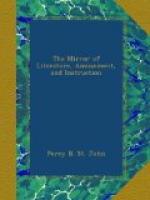On a vacancy on the Scotch bench, a certain advocate of some standing at the bar, but by no means remarkable for the brilliancy of his parts, or the extent of his legal knowledge, was in full expectation of being appointed to the vacant gown. This is done by a court letter, signed with the King’s sign manual. In the full flutter of his darling hopes, he one day encountered an old brother lawyer, notorious for the acidity of his temper, and the poignancy and acrimony of his remarks. “Weel, friend Robby,” said the latter, “I hear you’re to get the vacant gown.”—“Yes, Mr. C—k, I have every reason to believe so.”—“Have ye gotten doon your letter yet frae London?”—“No: but I expect an express every minute.”—“Nae doot, nae doot; have you bethocht yoursel o’ what teetle ye’re to tak’? Lord H—n will never do; ye ken that’s the teetle o’ ane o’ oor grandest dukes. Gudesake, for a bit session lordy, like you, to gang by that style and teetle o’ ane high and michty prince! that wad be a bonny boorlesque on a’ warldly honours and dignities. Weel a weel, let that be a pass over. Noo a teetle ye maun hae, that’s as clear as the licht, and there’s ane come just now into my head that will answer ye to a T; when ye’re a lord, freend, Robby, ye’ll be Lord Preserve Us?”—“You are very impertinent Mr. C—k,” replied the nettled judge expectant; “I am sure you may find a waur.”—There never, perhaps, was, or will be, comprehended so much pithy meaning and bitter sarcasm in a single syllable, as that which formed the astounding response—“Whaur (where)?”
* * * * *
GREGORY THE GREAT A PUNSTER.
Gregory the great was a punster, as appears from an anecdote related of him, and which gave the first impulse to his exertions to promulgate Christianity in this country. It was sometime before he was advanced to St. Peter’s chair, and when he was only a deacon in the church, that he saw some handsome youths for sale in the open market: struck with their appearance, he inquired whence they were, and was answered they were Angli (English.) “They are rightly called,” said he, “for they seem Angeli,” (of or belonging to angels,) and asking what province they were of among the Angli; he was told of Deira (part of the kingdom of Northumbria.) Ah, exclaimed he, De ira Dei sunt liberandi. Learning farther that their king was named Alle, he said how fitly may he sing Allelujahs to God, who possesseth such subjects. From that time he seriously endeavoured to bring about the conversion of the English nation, and a few years afterwards, being Pope, he happily effected it by the travels and labours of St. Augustine, who was the first Archbishop of Canterbury.
* * * * *
EPITAPH
In St. Mary’s Churchyard, Lambeth.




